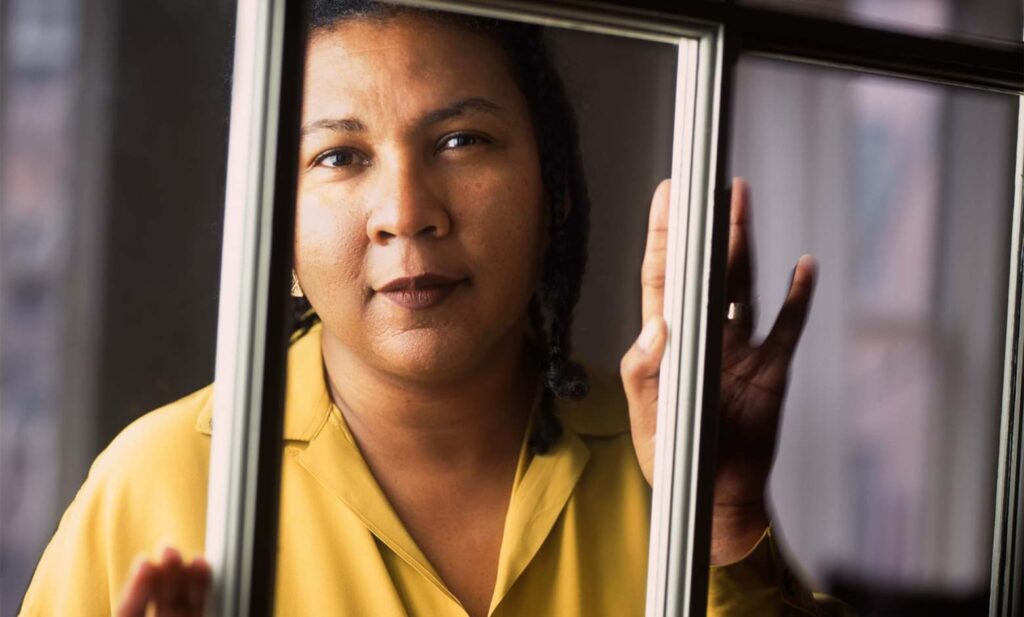bell hooks, a colossus of Black feminist thought, died on December 15 in her home in Berea, Kentucky. She was 69. Her writings are foundational to contemporary movements for justice and have opened countless doors in radical thought on race, class, gender and other forms of oppression.
hooks taught at Yale University, Oberlin College, University of California at Santa Cruz, and most recently at Berea College—a tuition-free school which caters to students with limited financial resources—where she was a distinguished professor in residence of Appalachian Studies.
hooks was the author of more than 40 books, including volumes of poetry, essay collections, and children’s stories. Born Gloria Jean Watkins, she chose the pen name bell hooks after her great-grandmother and declined to capitalize the name to encourage readers to focus on the “substance of books, not who I am.”
Her first major book, Ain’t I a Woman? Black Women and Feminism was published in 1981. It discussed the conditions faced by Black women in mainstream feminist movements that ignored them in favor of white supremacy and middle-class politics.
“A devaluation of Black womanhood occurred as a result of the sexual exploitation of Black women during slavery that has not altered in the course of hundreds of years,” hooks wrote in the book. In 1992, Ain’t I a Woman? was named one of the most influential women’s books of the previous two decades by Publishers Weekly.
hooks redefined feminism to be more expansive and more radical. “Feminism is the struggle to end sexist oppression,” she wrote in Feminist Theory: From Margin to Center. In Feminist Theory, she criticized liberal groups for promoting definitions of feminism that sought only to make women equal to men — despite the fact that some men, too, experience forms of oppression.
hooks was born in the deeply segregated South in 1952 in Hopkinsville, Kentucky. She chronicled how capitalism and slavery have laid the groundwork for the mistreatment of Black women in society. She wrote, too, of how Black people can assert self-determination in the face of a society seeking to dominate and suppress individualism.
She wrote extensively about love as a collective and individual practice — one that is antithetical to domination, and can propel society and progressive movements toward liberation.
In her 2000 book All About Love: New Visions, hooks wrote, “It is essential to our struggle for self-determination that we speak of love. For love is the necessary foundation enabling us to survive the wars, the hardships, the sickness, and the dying with our spirits intact. It is love that allows us to survive whole.”
Love must be radically conceived as a means to empower oppressed communities, hooks emphasized. As adrienne maree brown wrote for Truthout, drawing upon hooks’s work, it is impossible to receive that love from a nation that seeks to marginalize its non-white, non-wealthy communities; instead, the left must dispel concepts of love that are transactional or drawn upon oppressive power dynamics.
Many modern feminists and progressive thinkers have championed hooks for laying the groundwork for their own radical work; abolitionist and We Do This ‘Til We Free Us author Mariame Kaba, for instance, has credited hooks for helping to open her mind to the intersections of gender and race. Other writers have similarly said that hooks’s work was crucial to their intellectual development.
“For me, reading ‘Ain’t I A Woman’ was as if someone had opened the door, the windows, and raised the roof in my mind,” wrote journalist and author Min Jin Lee, who took a class taught by hooks at Yale University in 1987 and was inspired to seek out her work even though hooks herself didn’t assign it:
“[F]or me, a Korean girl who had been born in a divided nation once led by kings, colonizers, then a succession of presidents who were more or less dictators, and for millenniums, that had enforced rigid class systems with slaves and serfs until the early 20th century, and where women of all classes were deeply oppressed and brutalized, I needed to see that the movement had a space for me.”
hooks also regularly engaged in cultural criticism, and in more recent decades critiqued pop-culture figures and modern movements for their unidimensional conception of race, gender and other forms of oppression. She believed that engaging pop culture was important for advancing critical thinking.
As progressive communities honor and grieve hooks, her own words on grief, from All About Love, can be instructive:
“To be loving is to be open to grief, to be touched by sorrow, even sorrow that is unending. The way we grieve is informed by whether we know love. Since loving lets us let go of so much fear, it also guides our grief. When we lose someone we love, we can grieve without shame. Given that commitment is an important aspect of love, we who love know we must sustain ties in life and death. Our mourning, our letting ourselves grieve over the loss of loved ones is an expression of our commitment, a form of communication and communion.”
(Compiled by us from two articles by Sharon Zhang and in Truthout and Julia Conley in Common Dreams.)




